In a world where rapidly evolving technology commands the spotlight, Yu Xingzhong, director of the Institute of Advanced Studies in Humanities and Social Sciences (IAS) and chair professor of the Department of Global Legal Studies at the University of Macau (UM), asserts that true power lies within the human mind. As society navigates the uncharted waters of AI development, he urges everyone to cultivate their uniquely human qualities, including empathy and morality, as they can never be replicated by machines.
Tech’s Role in Shaping Legal Education and Practice
With almost three decades of experience researching the impact of technology on law, Prof Yu began exploring the application of artificial intelligence for legal reasoning in 1994. He takes a ‘technological realist’ view, avoiding speculation about technology’s potential utopian outcomes and instead concentrating on practical solutions based on the capabilities and limitations of existing technologies.
Prof Yu notes that AI is making significant progress in many areas of law, including legal compliance evaluation, contract drafting, and sentencing prediction. He believes that lawyers who lack technological proficiency will be replaced by those who possess it. That is why today’s law students must develop strong digital literacy skills, which are not just about understanding cutting-edge tools, but also include the ability to consider technology’s broader societal impact.
Prof Yu identifies a significant issue with the current use of AI in law – the ‘black box’ nature of most algorithms. Although these algorithms can provide answers to queries, they do not explain how they arrived at their conclusions. While ‘explainable AI’ technology is in development, it has not yet reached maturity.
Prof Yu adds that AI also lacks moral considerations, which is crucial in legal work. He says that moral considerations, which are key to the work of judges and lawyers, help ensure that laws align with social values and expectations. While moral considerations do not have a definitive right or wrong answer, they must align with the fundamental principles of human nature. To illustrate this point, he refers to a previous case where a man killed his grandfather to inherit his estate. Although from a legal standpoint, the man was allowed to inherit the estate, most people considered it morally wrong. Eventually, a judge applied the ‘unjust enrichment’ principle to prevent the inheritance. According to Prof Yu, while some researchers aim to integrate moral principles into AI systems, current technology is still incapable of comprehending the complexities of human moral reasoning.
Algorithmic Society May Exacerbate Injustice
In late 2022, Prof Yu published his latest book Digital Literacy: From Algorithmic Society to Web 3.0, which examines the potential pitfalls of an algorithm-driven society. The book has received critical acclaim, being included on China’s Legal Weekly’s top ten list of books about the rule of law in 2022, as well as the Xinhua Reading List by Xinhua Publishing House in February 2023.
In his book, Prof Yu examines some potential ways in which an algorithmic society might exacerbate injustice. Firstly, he addresses the long-standing influence of AI algorithms, particularly deep learning algorithms, on our daily lives. As American mathematician Cathy O’Neil points out, algorithms are ‘opinions embedded in mathematics’ that reflect their designers’ biases. Prof Yu warns that if algorithms are abused, biases will become more systematic, leading to problems such as unfair employee selection or inaccurate predictions of crime rates among ethnic groups.
In addition to addressing the issue of algorithm bias, Prof Yu also highlights the potential widening of the ‘digital divide’ as new technologies advance. Today, tech giants owning cutting-edge AI algorithms benefit from unparalleled productivity, while individuals skilled in developing and using new technologies enjoy career advantages. However, not everyone has the same opportunities to access such technologies. As companies compete to develop more intelligent machine learning models and algorithms, Prof Yu stresses the need for the government and society to take timely action to ensure these technologies are used fairly and align with fundamental human principles. Without such measures, he warns that the digital divide will continue to expand, pushing us further from an ideal society where both morality and rationality flourish.
Navigating from English Studies to Jurisprudence
Throughout his academic journey in jurisprudence, also known as legal philosophy, Prof Yu was profoundly influenced by his mentors and various serendipitous opportunities. Born in Min county, Gansu province, in Northwest China, Prof Yu took part in China’s first college entrance examination following the Cultural Revolution in 1977 and proceeded to study English at Lanzhou University. After graduation, he was assigned to work in the Department of Foreign Languages at the Northwest Institute of Political Science and Law (now the Northwest University of Political Science and Law) in Xi’an in 1983. However, foreign language departments were regarded as peripheral units within China’s political and legal institutions at that time, prompting him to consider pursuing a master’s degree in law in China to improve his career prospects.
In 1985, Prof Yu encountered a visiting Australian scholar couple: Eugene Kamenka, a philosopher at the Australian National University (ANU), and Alice Tay, a jurisprudence scholar at the University of Sydney. The couple was working on a book about Marxism in China and invited Prof Yu to join the History of Ideas Unit at ANU for 18 months to assist with translating Chinese materials. This experience in Australia exposed Prof Yu to diverse cultures, Western literature, and many renowned scholars of jurisprudence from around the world. Upon returning to the Northwest Institute of Political Science and Law in 1986, he transitioned to the Department of Law, formally embarking on a career in jurisprudence.
Exploring Legal History through the Great Qing Code
Prof Yu soon found a new opportunity to study abroad when R. Randle Edwards, a Chinese legal history specialist from Columbia Law School, visited the Northwest Institute of Political Science and Law in 1987. Edwards sought a scholar to assist in researching the Great Qing Code, which led to Prof Yu’s first trip to the United States in 1988. With his enhanced English proficiency after visiting Australia and a childhood fascination with classical Chinese literature, he was able to interpret the Great Qing Code written in Classical Chinese. ‘This experience sparked my interest in Chinese legal history,’ he says.
With Edwards’s support, Prof Yu later attended Harvard Law School to study social theory, Chinese law, and Chinese legal history under the guidance of Prof William P. Alford. Prof Alford is a distinguished Chinese law expert at Harvard, where Prof Yu obtained his master’s degree in 1991 and SJD in 1995. After completing his studies, Prof Yu worked as an associate at a law firm in Chicago for three years before embarking on a career in academia. He briefly held teaching positions at Peking University and Harvard, and then spent over a decade teaching and researching at the Chinese University of Hong Kong. From 2012 to 2022, he served as the Anthony W. and Lulu C. Wang Professor in Chinese Law at Cornell Law School.
In August 2022, Prof Yu joined UM as a chair professor in the Faculty of Law (FLL). He was appointed director of IAS two months later, in October of the same year. His extensive publication record includes several influential works, including Rule of Law and Civil Orders, Legal Pragmatism in the PRC, and Modern and Postmodern in Jurisprudence.
The Moral Foundations of Law
With experience in jurisdictions following different legal systems, Prof Yu has developed a multifaceted perspective on jurisprudence. ‘Many Western scholars study China as research material, but I see China as an object of study. I believe that China’s millennia-long moral-driven civilisation contains elements of thought that have universal significance and could be applied to improve modern society.’
Indeed, for decades Prof Yu worked towards developing an ideal social framework to achieve a harmonious balance between law and morality, as well as intellect and reason. ‘The foundation of law should be moral principles,’ he says. From his observation, modern Western societies and the contemporary world in general are dominated by a culture that prioritises rationality, rules, and individual rights. In contrast, while ancient China also emphasised rules, it placed greater importance on human relationships, or the concept known as ‘guanxi’ in Chinese. ‘Despite negative connotations of unfairness in certain contexts, “guanxi”, in its essence, refers to emotional connections between people, such as those between family members and friends.’ he adds. From his perspective, emphasising human relationships and emotional needs is increasingly vital in a rationality-dominant and rule-of-law society.
Fostering Interdisciplinary Research at UM
Before joining UM, Prof Yu visited the campus twice to speak at seminars, and he has since been impressed by UM’s vision and steps in fostering interdisciplinary research. Now as the director of IAS, he is leading the creation of a university-level research platform that transcends faculty boundaries. This involves establishing an internationally renowned interdisciplinary research team at UM and enables synergistic academic resource deployment. In FLL, he has been contributing to the development of a new English-taught bachelor of law programme in Chinese law and global legal studies.
Furthermore, Prof Yu is working on a book that delves into the philosophy of the heart. Through his book, he seeks to provide comprehensive insights into society, law, morality, and human nature in a systematic manner. In doing so, he aims to envision a social framework that recognises and nurtures our emotional needs. ‘I believe in the indomitable power of the human mind, which remains unparalleled by machines. This belief in human values is something everyone should uphold, and it has been the driving force behind my academic pursuits,’ he says..
Chinese & English Text / Davis Ip, UM Reporter Zhang Fangbo
Photo / Jack Ho, UM Reporter Harry Chen, with some provided by the interviewee
Source: UMagazine ISSUE 27
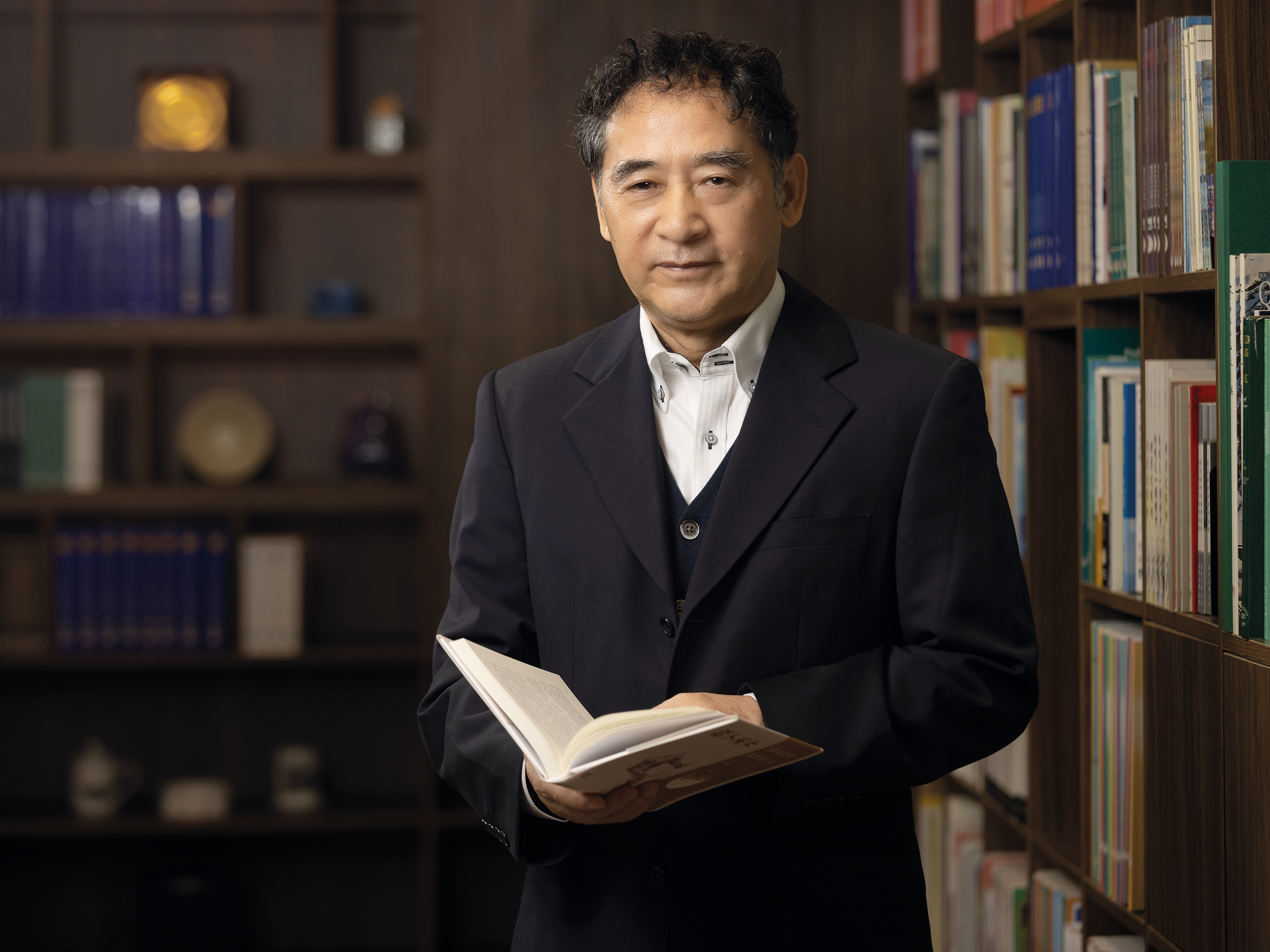
Prof Yu Xingzhong
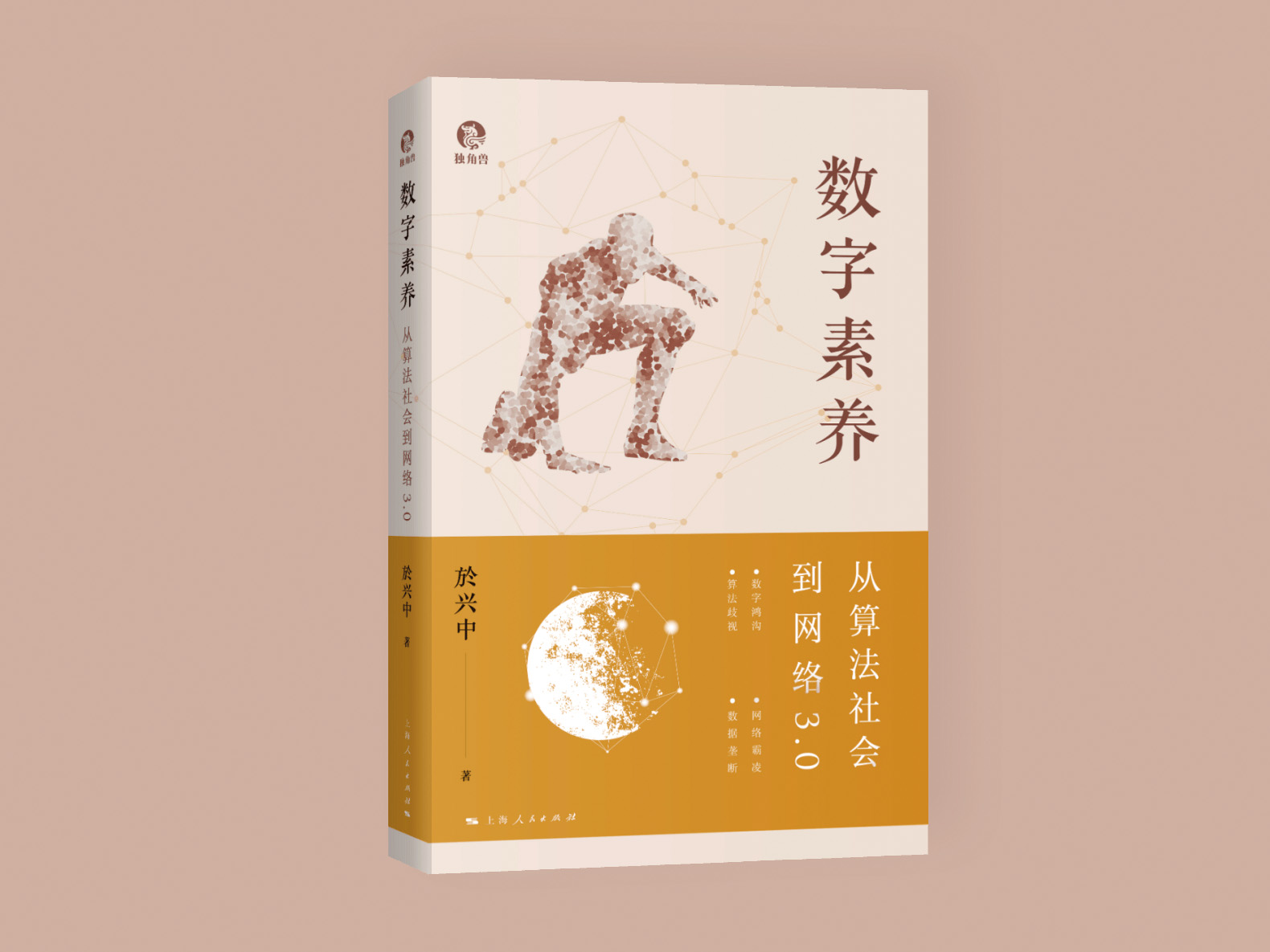
Prof Yu Xingzhong’s new book Digital Literacy: From Algorithmic Society to Web 3.0
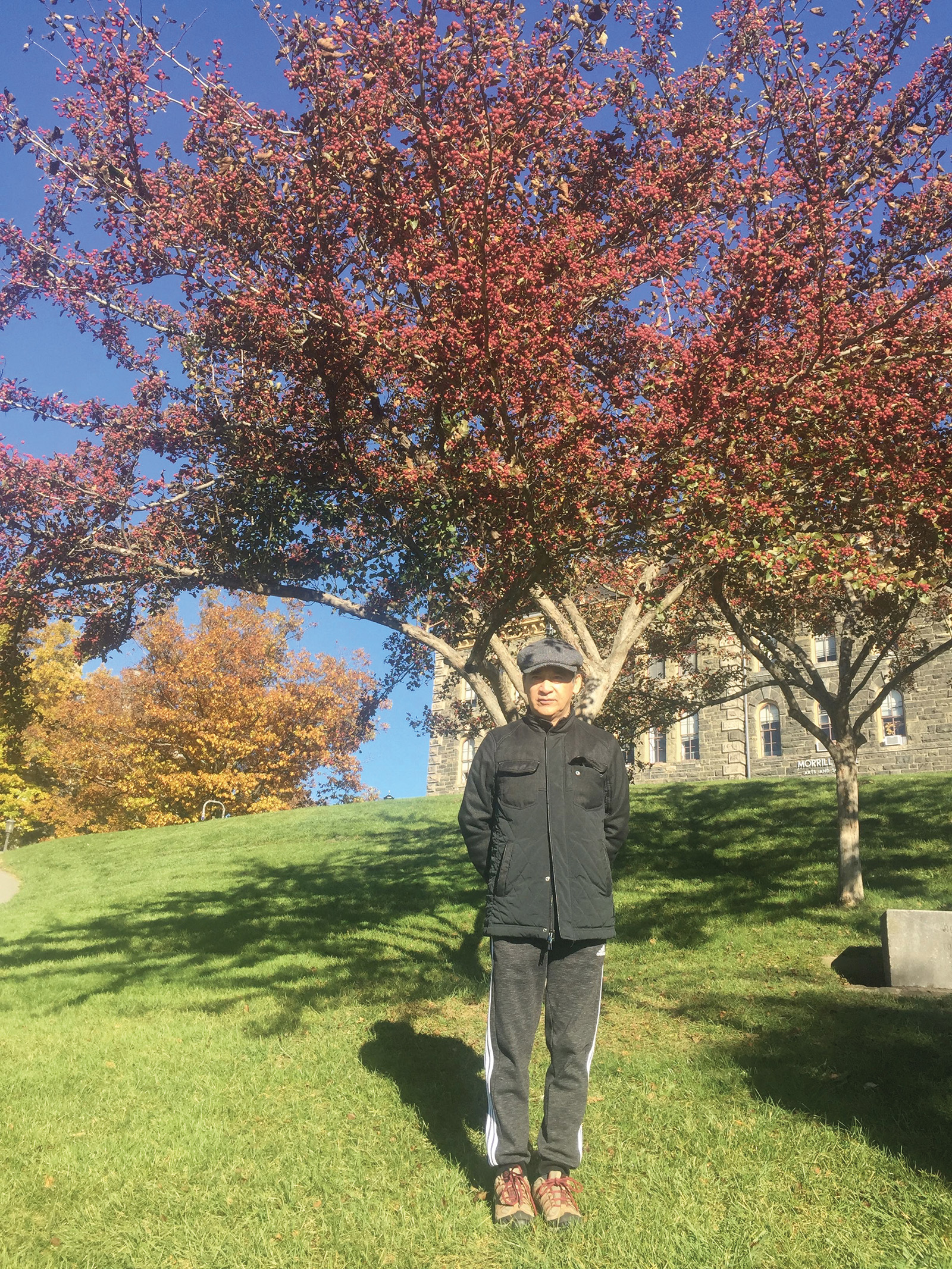
Prof Yu Xingzhong in Morrill Hall, Cornell University
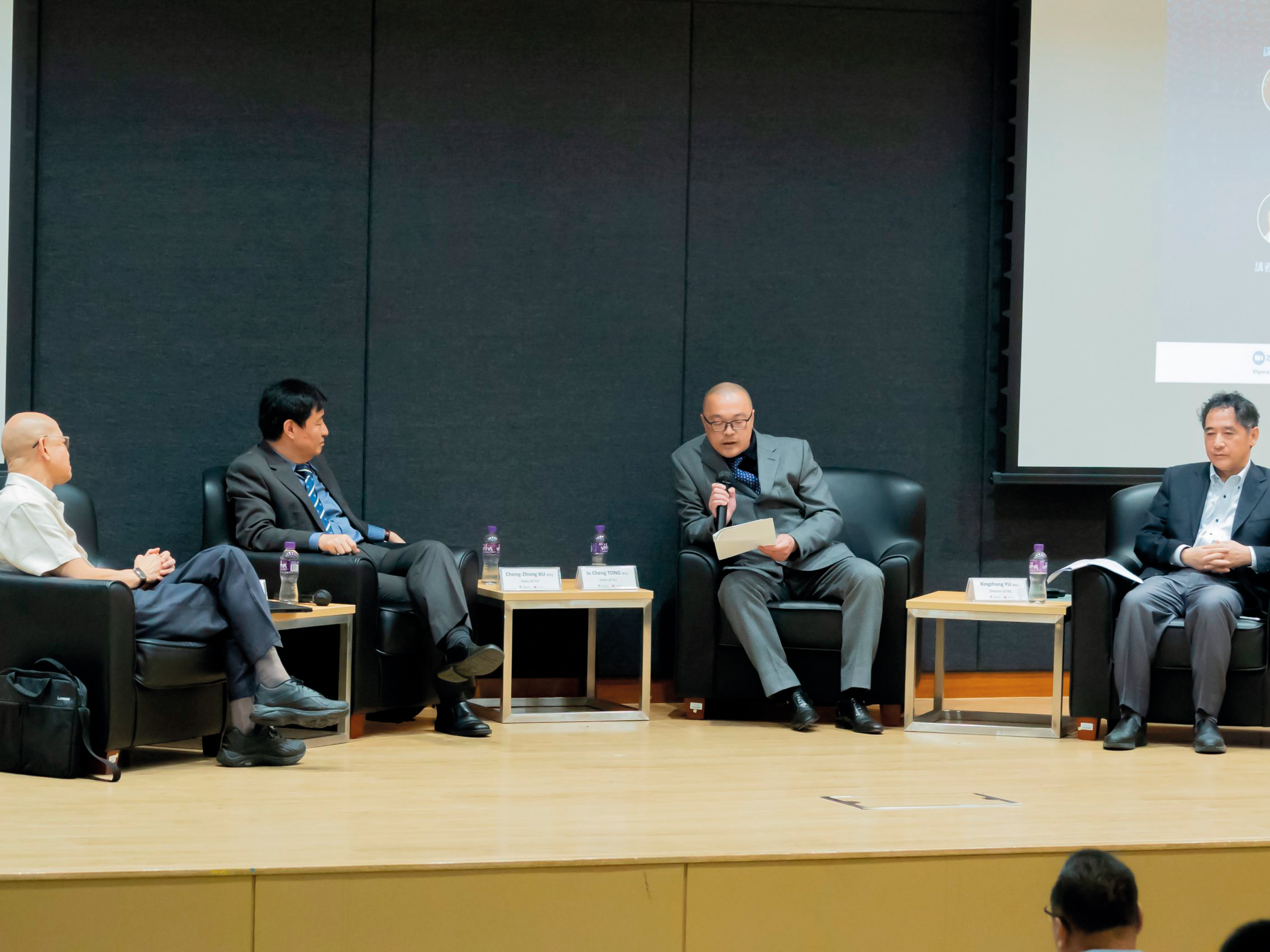
Prof Yu Xingzhong (right) moderates a roundtable discussion on the societal implications of large language models
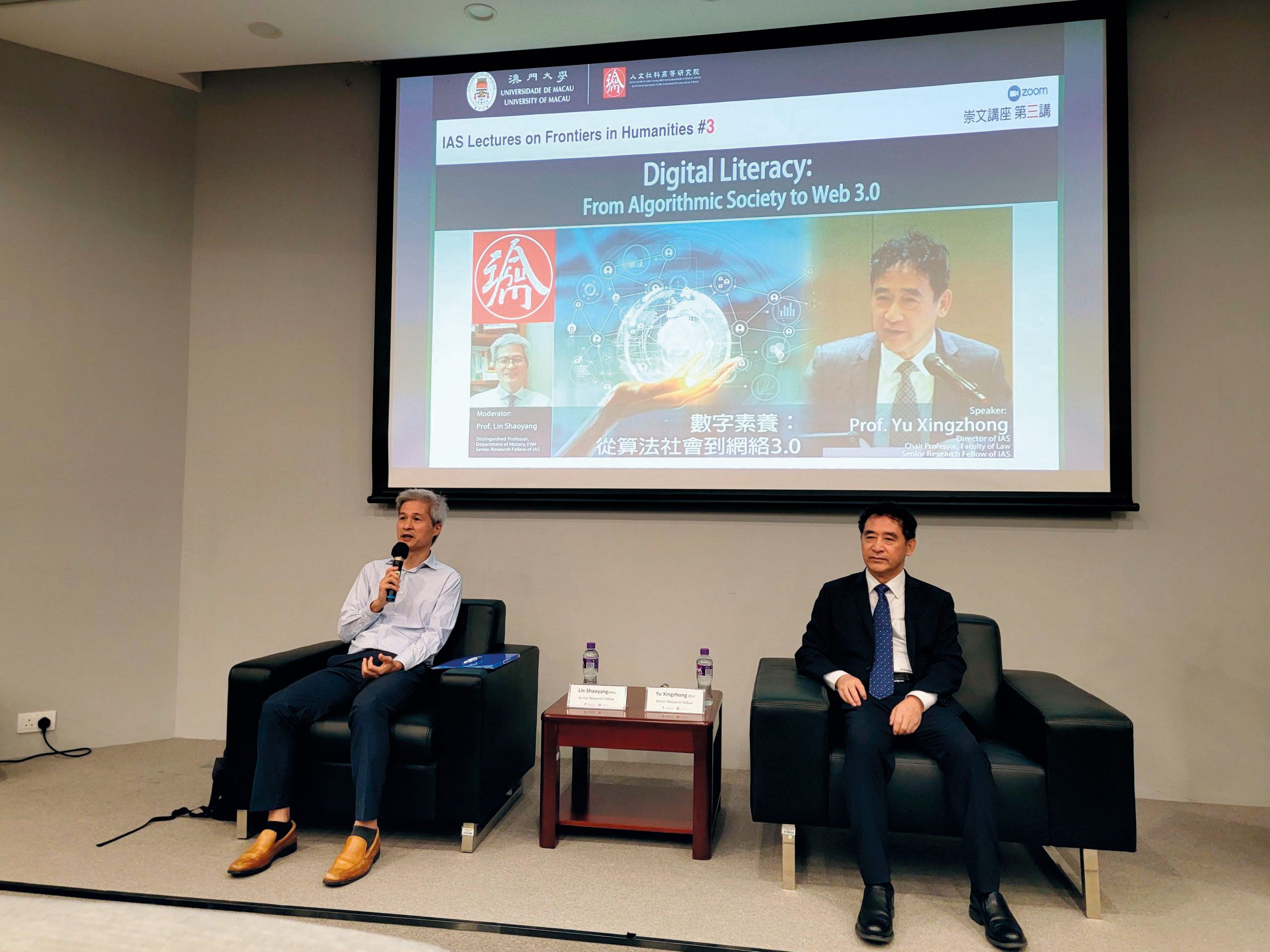
Prof Yu Xingzhong (left) hosts a talk about digital literacy in UM in 2022
